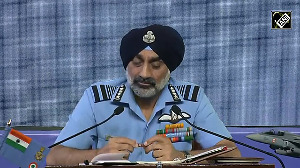Bruce Riedel and Karl F Inderfurth, who were the point persons for South Asia in the Clinton administration and are expected to play key roles if a Democratic administration recaptures the White House, particularly a Hillary Clinton Administration, have bemoaned the unraveling of the Indo-US civilian nuclear agreement.
But at a joint appearance in Washington to release an advance copy of a major report titled Breaking More Naan with Delhi: The Next Stage in US-India Relations, where they laid out several options for the next President to take the Indo-US relationship to the next level, they argued that one should not be fixated on this deal to the detriment of moving the blossoming Indo-US relationship forward.
Riedel, who served as special assistant to President Clinton and was the senior director for Near East and South Asian Affairs on the National Security Council from 1997 to 2002, said, "The Indo-US nuclear deal was a significant move, even further in the growing relationship between the two countries, and it is safe to say, that it is a very good deal for India, which is why it is so ironic that it is in trouble today in India."
He noted that it was a good deal for the US as well and that "it has also been endorsed by the International Atomic Energy Association."
Riedel, currently a senior fellow at the Brookings Institution, pointed out, "As we all know, it is now in serious trouble -- a combination of India's domestic politics and a lame-duck president here," and predicted that these two factors will "probably relegate the deal to hibernation for the next year or so. (But) One can't be sure."
"But one thing you can be certain about in Indian politics is that tomorrow will be very different than today, and anything could happen. But we are likely to see it go into hibernation."
However, Riedel argued that "the deal is not critical to the relationship. This relationship is mature enough now to go forward. Hopefully benefits of the deal can endure whether or not the specifics of it are implemented."
"But what it very much illustrates is that we need now to move even further," he said, and added, "If the deal goes into hibernation, it offers a unique opportunity and a necessity to do even more and to find further ways to advance this important and unique bilateral relationship."
Riedel said the "relationship with India is important because on every issue that matters to Americans about the future of the globe, India is at the center of it," and he cited everything from combating international terrorism to nuclear nonproliferation and fostering and promoting democracy worldwide to climate change.
"On all of these, India is at the epicenter of what's going to go right and were to go wrong, and that's why the next President -- him or her -- needs to have a strategy on how to advance the relationship," he said.
And, during the question and answer session, Riedel reiterated: "There is a lot more to be done in advancing Indo-US relations. It would be a shame if we now spent the next five years arguing over this deal. We should carry it through, but whether we do or not, there is a whole host of other agenda items out there, some of which frankly are bigger deals."
Inderfurth, who served as assistant secretary of state for South Asian Affairs from 1997 to 2001, said he was a "little bit more hopeful," than Riedel, and while acknowledging that it "may be in hibernation," added, "Indeed, I believe that the agreement can be saved."
He argued that "the nuclear issue in all of its manifestations has bedeviled Indo-US relations for more than a quarter of a century and it is not surprising that it is going to take some time and patience to sort these matters out, particularly with the strong domestic constituencies that are invested in these issues -- both in New Delhi and Washington."
But echoing Riedel's sentiments, Inderfurth, currently professor of international affairs at the George Washington University, said: "It is also important to recognize this agreement, while it is an important part, but it is not the sum total of our agenda with India, and this new relationship that we have."
"I think Dr Singh was getting at that point when he said that if the deal does not come through, this is not the end of life."
Inderfurth said the Indian Prime Minister "was putting it in perspective that India and the United States are going to go ahead with this relationship even if there is a temporary setback or hibernation for this agreement."





